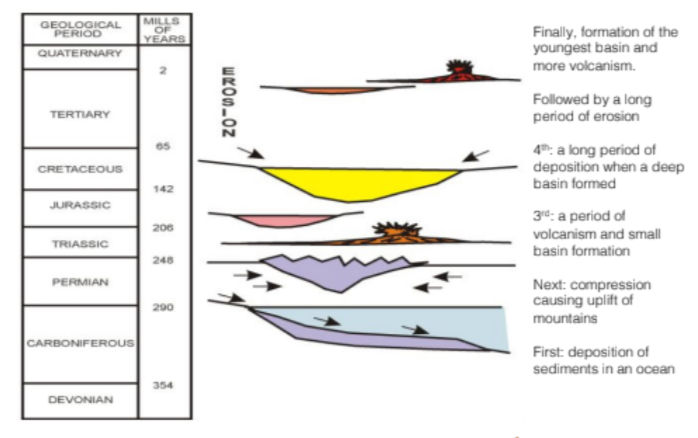Geologic Thinking
Why Earth science?
- Earth science is all about figuring out the past, how it changed throughout time, understanding where it is now, and what may happen in the future
- Geoscientists investigate Earth and how its systems work
- Earth science is all about change over time
The scientific theory/method:
The four processes of the scientific theory:
- observation
- theory
- prediction
- evidence
What else:
- Science starts by observing something and asking why it works that way
- The Scientific way of thinking organizes ideas and data to produce theories about how the natural world works
- A hypothesis is an idea about how or why something happens, but it is only scientific if it can be testable
Alfred Wegener:
- Alfred Wegener was an early geologist that proposed the idea of continental drift
Alfred Wegener’s key points:
- In science, you have to look at all the data
- The idea about how the world works comes out of the data, not vice versa
- As more studies are done and more data gathered, the ideas about how something works might change
Ockham’s Razor:
- William of Ockham was a monk who wrote ideas about theology and about thinking
- Principle of parsimony: When you have two hypotheses, both of which describe the data, the best one is the one with the fewest assumptions
Falsification:
- Karl Popper introduced the idea that scientific ideas had to be falsifiable
- It is the concept that puts the “prediction” and the “experiment” into the scientific method
- For any scientific hypothesis, you come up with there has to be a way to prove it wrong in order for it to be recognized as a scientific theory
Other ways of knowing:
- Intuition
- Faith
- Senses
- Gut feeling
Time creates a significant hurdle for experimentation in geoscience:
- Geological processes happen very slowly so it is not possible to experiment with some things
- Due to this geoscientists rely on geological reasoning
1st rule of geological reasoning: Uniformitarianism
- Uniformitarianism is the idea that the processes that are happening on earth are the same ones that happened in the past, and they will continue into the future
- Uniformitarianism was created by James Hutton
- James Hutton was known as the father of modern geology and was the first person to define how geologists think about rocks and time
Geologists’ reasoning is different from other scientists:
- Geologists’ reasoning is different because of the vastness of geological time
- Geologists’ reasoning is different because experiments over those long time frames are hard to run
- Geologists’ reasoning is different because data is missing
- Geologists’ reasoning is different because storytelling is part of the geologic understanding
- Geologists’ reasoning is different because many concepts that deal with geologic principles and processes are NOT linear
Geologic thinking is interpretive:
- The first thing a geologist does when walking up to an outcrop is start to think about: What is important to look at? What is important to ignore? What is the geologic story of this region?
- Perceptions are shaped by conceptions
- Interpreting requires circling small scale to large to small again
Geological thinking is historical:

- The goal of that picture is not to get down to this particular outcrop and figure out what is going on but to give you an idea of how geologists build a story of a rock
- How we put it into a narrative context and build the time into the interpretation of what is happening
- The goal isn’t primarily to describe rocks but rather to infer how they got there
- Arguments from analogy are important and valuable
- Narrative logic presents details in the context of the whole picture
- Geologists tell a story that gives context and meaning to their research
Geoscientists’ Unique Skill Set:
- Taking a long view of time
- Interpreting based on a systems approach
- Translating field observations into inscribed data
- Visualizing 3D data in 2 dimensions
Thinking about time
Geologists understand that the Earth is very old and that processes take a very long time: this alters perceptions of humans’ place in the world
Expect low-frequency, high-impact events to happen quickly and end quickly
Expect low-frequency, high-impact events: asteroid impact, ice ages, massive floods, large volcanic eruption
Expect low-frequency, high-impact events can change the landscape and climate and have very large impacts on Earth
Understand slow change is responsible for most of this version of Earth
May bring unique insight into environmental issues
Understanding Complexities
paying attention to how processes are active and interact
The Earth system contains complex feedback loops
Feed back loop is a threshold concept idea that when you start to make a change, the change causes a chain reaction, and the circles back to the initial position
Learning in the field
- Observations play a central role in geologic studies
- Professional Vision- Seeing what is important
- The ability to translate observations into inscriptions that other geoscientists can read is vital
Spatial Thinking
- Expansive: envision across wide areas and realize that they were once connected
- X-ray eyes: envision below the surface
- 3-dimensional thinking: see 2D but envision 3D and vice versa
- All these skills require natural ability, learned ability, and specialized tools